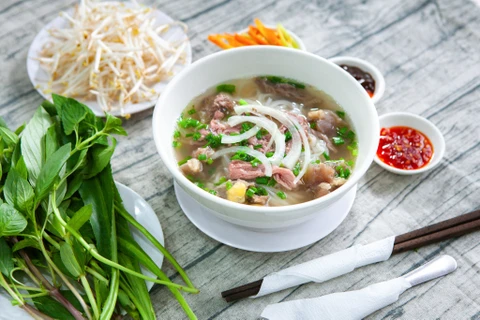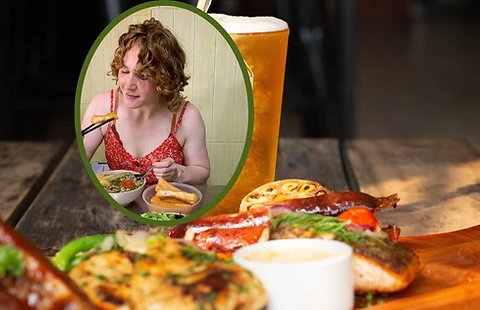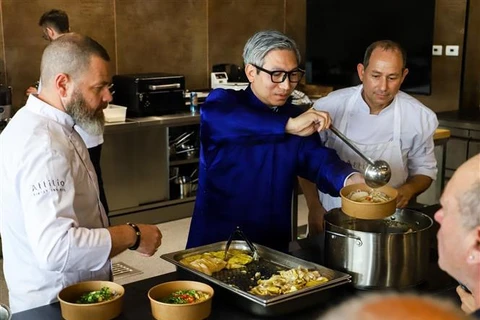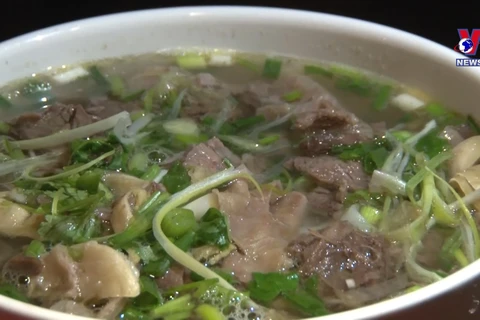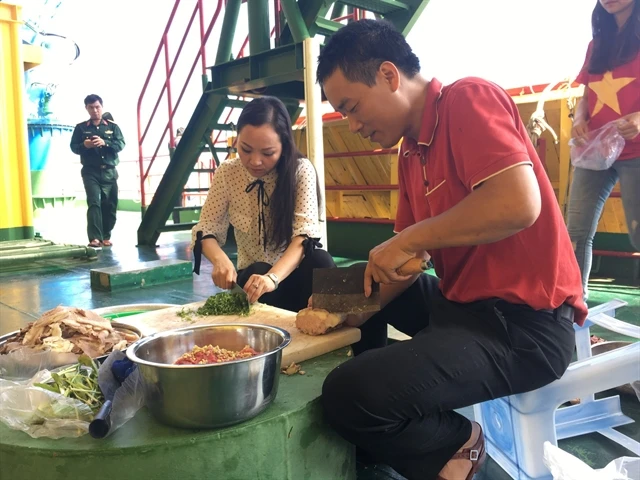 Vu Ngoc Vuong brings his famous Nam Dinh 'pho' to Truong Sa (Spratlys) three times. (Photo vietnamnet.vn)
Vu Ngoc Vuong brings his famous Nam Dinh 'pho' to Truong Sa (Spratlys) three times. (Photo vietnamnet.vn) Born in a family with a tradition of cooking the dish for three generations, Vuong himself has been in the business since 1993 in Hanoi with his father. He started his first restaurant at the age of 20.
Now with five restaurants and thousands of bowls served to happy customers across Hanoi, Vuong brought his famous dishes and recipes to the faraway islands of Truong Sa (Spratly), reported vietnamnet.vn.
"The journey was quite a feat. Many people go on business trips to Truong Sa with just their essentials like paper, pens, computers, cameras... but I carried along 50 crates of ingredients," said Vuong.
The trip to Truong Sa in April this year was the third time that Vuong brought ’pho’ to serve the officers and soldiers stationed on the remote islands.
In 2013, Vuong made his first visit to Truong Sa.
On that trip, Vuong's close friend, Vietnam News Agency journalist Nguyen Hong Ky, noted that ’pho’ is craved by islanders, and asked Vuong to try the almost impossible task of bringing the dish in its finest taste to Truong Sa.
Taken by surprise, Vuong responded firmly: "I am ready for the challenge, but I need a week to test the food preservation."
According to Vuong, bringing ’pho’ to the islands is not a simple task because it requires bringing along various ingredients such as vegetables, ’pho’ noodles, beef, and more. To make a delicious and authentic bowl of ’pho’, besides his own secret recipe, the ingredients used must be fresh and clean.
"A trip to Truong Sa takes more than 10 days, so I had to experiment with how to keep the food fresh and delicious," Vuong added.
Once he found a way to preserve the food and easily transport it to the islands, Vuong was determined to join the mission to Truong Sa. That year, his trip was a resounding success. Over 1,000 bowls of ’pho’ were prepared by Vuong and offered to the officers and soldiers on the ship and at three different islands.
'One more bowl, please'
"When the bowls of ‘pho’ were served, the first thing the soldiers did was take photos of the food. Everyone's faces were filled with excitement and happiness. Many soldiers were overwhelmed with nostalgia for home because it had been such a long time since they had the opportunity to eat ’pho’. There were also soldiers from remote and distant regions who had never tasted ’pho’ before, so they were deeply moved," Vuong recalled.
While observing the officers and soldiers enjoying ’pho’ and witnessing their appreciation for the food he had put so much effort into, Vuong felt overwhelmed. Therefore, when a hesitant soldier asked, "Can I have another bowl?", he eagerly served him right away.
However, upon returning home that year, despite the pride of setting foot on the sacred land of the nation and bringing the traditional cuisine of their homeland to the distant islands, Vuong still felt a bit regretful. "Because not every island I visited could be served ’pho’."
After the trip, Vuong wished that if he could return to the islands for a second time, he would bring ’pho’ to every island that he visits.
In 2017, his wish came true as Vuong brought over 2,000 bowls of ’pho’ to serve the officers and soldiers at the islands he visited outside of Truong Sa.
"That year, I even brought ’pho’ to oil platforms. The journey was challenging, but as soon as I set foot on the island, a surge of pride made me forget all the exhaustion.
"At 5am, when the ship arrived at the island, the soldiers had prepared a pot of boiling water for me. I asked for their assistance, some peeled onions, others prepared the ingredients. By 5:45, I had ’pho’ ready, and by 6:15, everyone on the island had finished eating.
"The job required quick hands, but when done with passion and enthusiasm, I didn't feel tired; I only felt excited. It's an emotion I will never forget," Vuong said.
After nearly 30 years in the business, ’pho’ is no longer just a means of living for Vuong's family. It has become a source of pride for the people of Nam Dinh in general and those who have inherited the traditional craft of ’pho’ in particular.
For them, preserving the ancestral secrets of the dish is not just about preserving the cultural heritage of the town but also about bringing joy to people everywhere./.
VNA
